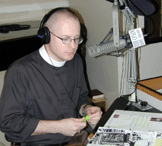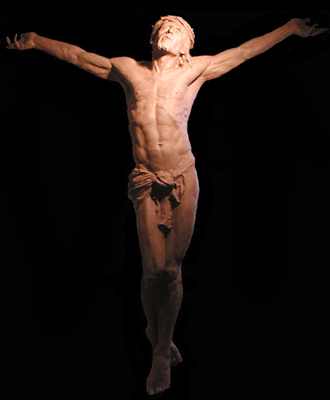Grace, mercy, and peace to you from God our Father, and from our Lord and Savior, Jesus Christ, amen. The text for the sermon this morning comes from the Epistle, which was read earlier.
Divisions. We find them everywhere. We see them in sports. It’s the AFC versus the NFC in football. It’s the American League versus the National League in baseball. In politics, it’s Republican against Democrat. We have male and we have female. We have ethnic divisions: black and white. We have age divisions: young and old. Wherever you look, there you will find divisions.
In the Church, it’s no different. You have Lutheran, Baptist, Methodist, Roman Catholic, Pentecostal, Reformed, Orthodox and the list goes on. Even the Church during the time of Paul faced divisions. Here in our text for today, Paul asks a question which needs asking: “Is Christ divided?”
No one familiar with the New Testament can escape the conclusion that God intends those who are drawn to Him by faith and life within His grace shall live in unity with each other. Jesus understood that His disciples would have problems with this, and in His heart-to-heart talk with them the night before He died, He declared, “By this all people will know that you are my disciples, if you have love for one another.” When that memorable evening in the upper room concluded with His prayer of intercession, He laid before the Father the plea that “they may be one” even as He and the Father were one. Unity of mind and purpose, living in love and harmony, oneness in Christ, are God’s intention for His family. Our love for each other identifies us as disciples of Jesus.
It is over against all of this that we must face up to the divisions within the household of faith and see them, not just as inevitable consequences of history, but also as signs of human frailty and sinfulness, as signs of the attempts to reduce the greatness and grandeur of God and His limitless compassion for the whole human family to the measure of small minds and timid hearts.
“Is Christ divided?” Paul asks? We respond quickly, “Of course not!” But a second question comes bearing down on us: “Why then is His church divided?” We are left uncomfortable and ill at ease. There is something here which is not right, and we know it.
Paul had visited Corinth on several occasions, at least 3 times on his missionary journeys. This was one of his churches to which he was the pastor of. He founded the church in the midst of Corinth’s reputation: sexual immorality, religious diversity and corruption. Paul shows a concerned, loving approach to factious errors. He calls all the Corinthians “brothers,” not giving any substance to their claims of separatism. His address is unifying. Though he is one who was lauded as a leader, he puts himself and them on the same plain as forgiven sinners whom God has elevated to saving heights. His only motive in coming to them lies in his concern and love for the Lord. Paul appeals to them as brothers, not as one superior than another. He doesn’t recognize one’s ability over another. He doesn’t recognize one’s poverty over another. They are all “brothers” in the faith of Jesus Christ.
You and I are all “brothers” in the faith of Jesus Christ. But like any family, there will be disagreements. There will be fights. There will be divisions. You will get mad at one another and storm off. However, we are still family, members of the family of God. We have all been bought for a price, the price of our Lord and Savior’s very life. Through His life, death, and resurrection, we have been brought into God’s family.
The message which Paul is giving to the Corinthians is one of unity, not of division. Under the heading of religion these people think there is room for doctrinal variety, as if the Lord allows two diverse understandings to be true at the same time! That may apply to the philosophy and human ethics of some, but not so with our Lord. He is a God of order. There is only one way that is God’s way. There is only one doctrine and that is what is found in the Word of God. We can try to make our own doctrine. We can try to make the Word of God say what we want it to say, but in the end it remains the Word of God. The Word of God doesn’t change. It’s been the same Word of God for 2000 years and will continue to remain the Word of God long after us. We can understand why Paul was so troubled as he wrote to the church at Corinth. Word had come to him that this fragile church, barely on its feet, was torn by dissension. The people were not getting along together. They were dividing into competing groups, based on which apostle had led them to faith. One group identified with Paul, another Apollos, another Peter, and another, as a smack in everyone’s face, claimed they belonged to Christ. Instead of rejoicing in their oneness in Christ, they were splitting off into separate groups, each one uncertain about the integrity of the other.
Paul could see that the future of that congregation, set within the turbulent environment of bustling Corinth, was threatened. Paul was not just offering some sound advice, but was calling upon the authority of Christ Himself to set things right. It was immaterial who baptized them; the overriding truth was that they had come into a new kingdom of love and grace, and this determined that they should live in peace and harmony with each other in the name of Jesus Christ.
It may seem to us that these people were hung up on unimportant matters, and that is just the point! Time and time again, the unity of the Church has been threatened by turning minor matters into major issues. But what about when the Church is truly divided over issues that are important, such as doctrine? Are we to turn a blind eye to doctrinal statements that God is not the only way to heaven? What about that Jesus Christ was just a man who taught some really good things, lived a good live, however He isn’t the Son of God? What about that the Lord’s Supper is just a snack of bread and wine and that you receive nothing from it, other than quenching your hunger? These are some “doctrines” which other denominations hold who say that they “follow Christ.” If you open up the Word of God, you will not, no, not ever, never once, find these “doctrines” that “follow Christ.” We deny the truthfulness of God if we tolerate unscriptural practices in others and call ourselves one with them in faith.
We come back to the question which we began with: “Is Christ divided?” The Apostle Paul teaches about Christian unity under God. He appeals to the fact that Christ is not divided. Paul reminds them that he was not crucified for them. Jesus died on the cross. Only the name of Jesus is divine and able to save. It would likewise be absurd and wrong to baptize in the name of any other person than the Lord.
In the realm of preaching the Gospel, no division can be tolerated. Preaching the gospel was Paul’s chief calling. In carrying out this ministry he could have fallen into the habit among the Greeks of relying on “words of eloquent wisdom” and rhetorical skills. “Words of eloquent wisdom” refers to human philosophy with its habit of replacing “old” ways of thinking with “new” ways. But, as Paul points out, if this were the practice, then “the cross of Christ [would] be emptied of its power.” Soon no one would listen to the Bible or heed the name of God.
Christ is not divided because He is “the way, and the truth, and the life. No one comes to the Father except through” Him. Jesus Christ is indeed the very Son of God, who came to be your Savior. Jesus Christ did indeed die on the cross and was raised from the dead three days later. If you believe that the Bible is the Word of God, then none of this is up for debate. If, however, you believe that the Bible contains the Word of God, then you, the reader, can decide for yourself what you want to believe. You can decide if Jesus is true God, true man, both, none of the above, or if He even existed at all. When one views Scripture from this viewpoint, Christ is indeed divided, because Christ is one thing for you and a different thing for me. Christ died for you because you believe that He is the Son of God. Christ did not die for me because I believe that Christ was just a man who led a good life. Christ is divided because people make Scripture say what they want it to say. Christ is divided because denominations make Scripture say what they want it to say.
For those who are resting securely in Christ’s forgiveness, given to us through His life, death and resurrection, given to us at our baptism, given to us through Word and Sacrament, Christ cannot be divided because it is Christ and Christ alone who saves. In the name of Jesus, amen. Now the peace of God which passes all understanding, keep your hearts and minds through faith in Christ Jesus, amen.
Epiphany 3A 2008




